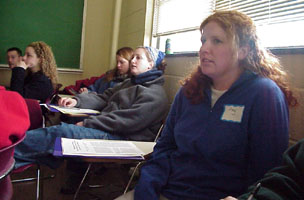
 |
2000 TEACHER EDUCATION WORKSHOP ON ALCOHOL ABUSE IN ADOLESCENCE
 Alcohol
abuse in adolescence is the most persistent and pervasive problem negatively
affecting the physical health, emotional well-being and educational performance
of students, both inside and outside the classroom and recent studies have linked
early drinking behavior to later alcoholism. It is important that teachers be
fully aware of 1) the patterns and problems of youthful alcohol abuse, 2) the
resources available to become more knowledgeable about the complexities of the
problem, and 3) the varied opportunities to bring these issues into the classroom
in a variety of course subjects and in informal discussions with students. In
order to enhance teacher awareness in these areas, the Alcohol and Other Drug
Education Project of Hobart and William Smith Colleges sponsored a workshop
for local area professionals working in secondary education and for college
students at Hobart and William Smith preparing for careers in education.
Alcohol
abuse in adolescence is the most persistent and pervasive problem negatively
affecting the physical health, emotional well-being and educational performance
of students, both inside and outside the classroom and recent studies have linked
early drinking behavior to later alcoholism. It is important that teachers be
fully aware of 1) the patterns and problems of youthful alcohol abuse, 2) the
resources available to become more knowledgeable about the complexities of the
problem, and 3) the varied opportunities to bring these issues into the classroom
in a variety of course subjects and in informal discussions with students. In
order to enhance teacher awareness in these areas, the Alcohol and Other Drug
Education Project of Hobart and William Smith Colleges sponsored a workshop
for local area professionals working in secondary education and for college
students at Hobart and William Smith preparing for careers in education.
![]() Workshop Participants
Workshop Participants
Workshop Leaders:
H. Wesley Perkins, Ph.D., Professor of Sociology at Hobart and William Smith Colleges.
Dr. Perkins is Co-Director of the Alcohol Education Project and is a nationally recognized researcher, speaker, and consultant on alcohol abuse in youth and young adulthood with special expertise on topics of peer, gender, family, and environmental influences on drinking.
David Craig, Ph.D., Professor of Chemistry at Hobart and William Smith Colleges.
Dr. Craig is Co-Director of the Alcohol Education Project and is a leader in national prevention efforts using electronic media and curriculum infusion strategies. He has special expertise in teaching about the biochemistry of alcohol and its effects and making the material accessible for students and teachers of diverse backgrounds.
HWS Student Teacher Participants:
Allen, Stephanie
Conklin, Renee'
Fesnmyer, Tracy
John, Amanda
Mahoney, Carol
Noye, Kimberly
Rucker, Erin
Weidner, Amy Beth
Cinadr, Mary
Contos, Chrissy
Heberle, Alyssa
Li, XiLi
McGregor, Jelecia
Reineke, Julie
Stutphen, Bob
Weinstein, Kim
Coleman, Toby
Desmond, Amy
Iorio, Ralph
Lowengard, Sara
McGuinnes, Melissa
Rendell, Mark
Wallace, Cheryl
Young, Kate
Teacher/Administrator Participants:
Augustine, Carlene (Romulus Gr. 5-6 Special Ed.)
Gelatt, Alan (Romulus Gr. 10, 12)
Heizman, Ann (Romulus Computer Teacher)
Sepe, Ann (Romulus Gr. 5-8 Special Ed.)Galusha, Nancy (Romulus Gr. 6)
Godwin, Mary (Romulus Gr. 5-6 Special Ed.)
Johnson, Cornelia (Seneca Falls)
Waid, Craig (Romulus 7-12 Health)
![]() Workshop Schedule
Workshop Schedule
Workshop Syllabus - Lansing Hall 300, February 12, 2000
| 9:00 - 9:15am | Purpose and Introductions |
| 9:15 - 10:00am | Overview of national trends and patterns of adolescent use. Youth Drinking: Risk Factors and Consequences |
| 10:00 - 10:30am | Science of alcohol and its effects on human behavior: Part I -- Blood Alcohol Concentration (BAC); Absorption and Metabolism of alcohol; Gender and Ethnic differences. (See slides here) |
| 10:30 - 10:45am | Break |
| 10:45 - 11:15am | Science of alcohol and its effects on human behavior: Part II - Overview of BAC and the pharmacology of alcohol and its effect on the brain with emphasis on tolerance, dependence, and withdrawal; recognition of these problem indicators among adolescents; Fetal Alcohol Syndrome - physical and cognitive manifestations and implications for teenage pregnancy. (See slides here) |
| 11:15 - 12:00 | Social and psychological causes of abuse in school populations. |
| 12:15 - 1:15pm | Delancey House Lunch/Discussion of common interests in Scandling Common Room; identification of key issues for elementary, middle and high school education levels; identification of potential program development strategies. |
| 1:30 -2:30pm | Using social norms as a prevention strategy for youth. "College Student Misperceptions of Alcohol and Other Drug Norms among Peers" (download article from HEC). "Prevention through Correcting Misperceptions of Alcohol and Other Drug Norms" (download article from Catalyst). |
| 2:30 - 2:50pm | Resources: Print and video materials available locally and world wide web links to resources for students and teachers |
| 2:50 - 3:00pm | Concluding comments and evaluation |